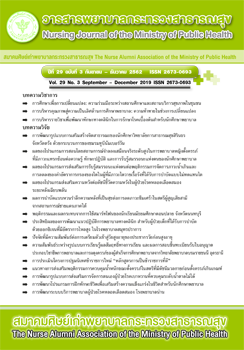Development of Life Skills Training Program to Promote Resilience among Nursing Students
Main Article Content
Abstract
Life skill training to enhance student nurses’ resilience is necessary. The purpose of this research were 1) to study the resilience and guidelines for improving the resilience of nursing students; 2) to develop a life skills training program; and 3) to study the effectiveness of the program. The research design of this study was Research and Development. The program was undertaken with 3rd year nursing students, Boromarajonnani College of Nursing, Chon Buri. The sample comprised 127 students. The research instruments consisted of a life skills training program and the resilience scale with reliability at .80. The data were analyzed by using mean, standard deviation and t-tests. Qualitative data were analyzed by using content analysis.
Result of the study were as follows: The nursing students had the resilience score at the low level ( =63.53, SD=7.66) before joining the life skills program. The guidelines for improving the resilience for nursing students were that there should be teaching and learning that promotes resilience so that students can develop themselves to be able to effectively deal with situations that cause complications or crises in life by using a variety of group processes and teaching methods. The life skills training program t consists of 6 sets of components, including 1) Resilience, 2) Self-esteem, 3) Thinking and decision making, 4) Stress and anger management, 5) Effective communication, and 6) Preparation for dealing with unexpected situations. The program implementation included 50 minutes of activity twice a week for 3 weeks. The study of the effectiveness of the program was students after joining the activities found that they had developed a high level of resilience (= 114.49, SD=6.46). In conclusion, the life skills training program can promote the resilience for nursing students.
Article Details
บทความและรายงานวิจัยในวารสารพยาบาลกระทรวงสาธารณสุข เป็นความคิดเห็นของ ผู้เขียน มิใช่ของคณะผู้จัดทำ และมิใช่ความรับผิดชอบของสมาคมศิษย์เก่าพยาบาลกระทรวงสาธารณสุข ซึ่งสามารถนำไปอ้างอิงได้
References
2. Grotberg EH. Tapping your inner Strength: How to find the resilience to deal with anything. Oakland: New Harbinger; 1999.
3. Nintachan P. Resilience and risk-taking behavior among Thai adolescents living in Bangkok, Thailand [Doctoral thesis]. Rischmond, Virginia Commonwealth University, Richmond, Virginia. 2007.
4. Thomas LJ, Revell SH. Resilience in nursing students: An Integrative review. Nurse Education Today 2016;36:457-62.
5. Arpanantikul M, Puttawattana P, Vitayasuporn J. Health and practice health characteristics of Thai nursing students. Thai Journal of Nursing council 2011;26(4):123-6.(in Thai).
6. Thanoi W, Pornchaikate Au-Yeong A, Ondee P. Factors affecting the mental health of the faculty of nursing students, Mahidol University. Thai Journal of Nursing council 2012;27 (Special Issue):60-6. (in Thai)
7. Nintachan P, Moon MW. Modification and translation of the Thai version of the Youth Risk Behavior Survey. Journal of Transcultural Nursing 2007;18(2):127-34. (in Thai).
8. Botvin GJ. Life skills training: an evidence-based approach for preventing alcohol, tobacco, illicit drug abuse and violence [internet]. 2010 [cited 2018 Sept 15] Available from: http://www.lifeskillstraining.com.
9. Botvin GJ, Griffin KW. (2004). Life skills training: empirical findings and future directions. The Journal of Primary Prevention 2004;25(2):211–22.
10. Botvin GJ. (2000). Life skills training: promoting health and personal development, teacher’s manual 1. Princeton, NJ: Princeton Health Press and Health 2000;24(4):250-7.
11. Grotberg EH. Resilience for tomorrow [internet]. 2005. [cited 2018 Sept 15]. Available from http://resilnet.uiuc.edu/library/grotberg 2005_resilience-for-tomorrow-brazil.pdf
12. Drapeau S, Saint-Jacques M, Lepine R, Begin G, Bernard M. Processes that contribute to resilience among youth in forest care. Journal of Adolescence 2007;30:977-99.
13. Phuphaibul R. (2005). Participatory adolescent health promotion. Bangkok: Judthong company. (in Thai)
14. Kamanee T. Science of Teaching. 5th ed. Bangkok: Chulalongkorn University printing press. 2009.
15. Nintachan P, Sangon S, Thaweekoon T. (2012). The effect of the resilience enhancing program in graduate nursing students. Thai Journal of Nursing 2012;61(2):18-27. (in Thai)

